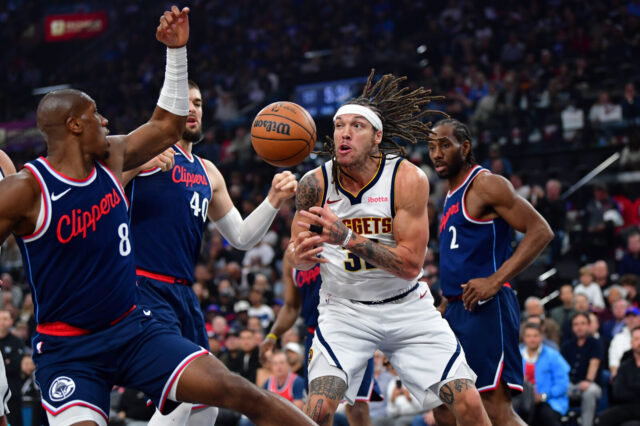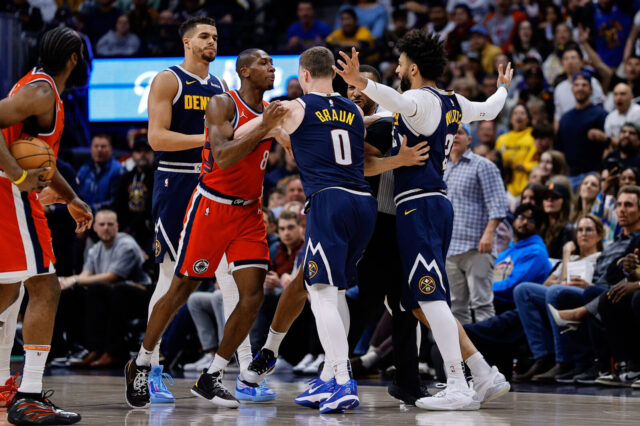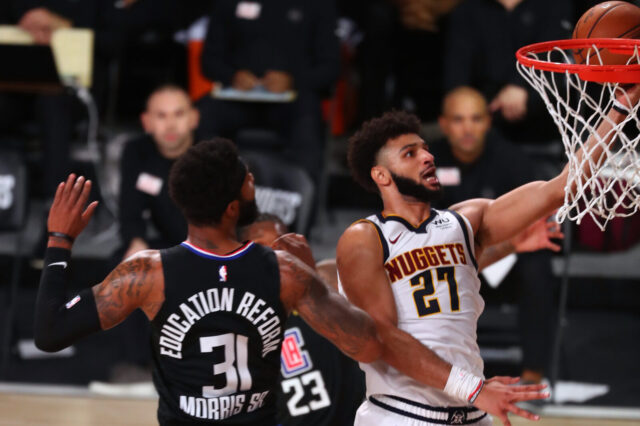At one point during the 2019 preseason in October, I was asked to give my realistic expectations for Michael Porter Jr. and what he could be for the Denver Nuggets in his rookie season. Coming off of back surgery and missing basically two seasons of development, it was fait to temper expectations for playing time; however, I offered up the Jayson Tatum comparison as a rookie. I expected Porter’s role in the offense to look fairly similar to Tatum’s role on a per-possession basis next to Kyrie Irving and Al Horford in 2017-18 — a complementary player used to space the floor and occasionally get his own offense as a tall, perimeter based forward.
What we got instead, at least on a per-possession basis, was arguably closer to the version of Jayson Tatum this season, i.e. the player many are calling an All-NBA caliber forward.
This content is no longer available.
The two numbers that stand out most for Porter: his minutes and his rebounding. It’s difficult to gauge how impressive his per-possessions stats are because he only played 14 minutes per contest. On a Nuggets team hoping to compete for a championship this season, incorporating Porter and his subpar defense was an immensely difficult task for head coach Michael Malone. On a nightly basis, Malone had to balance dealing with Porter’s flaws versus not developing him at all and leaving the rookie on the bench. More often than not, the choice was made to sit Porter.
In the 48 games Porter stepped on the floor this season, he played less than 10 minutes 20 times. It’s hard to develop a rhythm in less than 10 minutes, and in those 20 games, Porter averaged just 3.3 points per contest and shot 50% from the free throw line, a reasonable indicator of comfort for a shooter.
The other 28 games were evenly split between Porter playing 10 to 19 minutes per game in 14 contests and 20+ minutes per game in 14 contests. Focusing on games in which Porter played extended minutes offer a glimpse of his potential, because in those 14, he averaged 15.0 points, 8.6 rebounds, and 1.6 assists per game on 54.9/48.1/81.3 shooting splits. That boils down to a 66.3 True Shooting %, truly absurd efficiency. In those 14 games with 20+ minutes, Porter scored in double digits 12 times, hit at least one three-pointer 12 times, accumulated at least eight rebounds nine times, and shot above 50% from the field nine times.
More than anything, Porter looked the part of a burgeoning elite scorer and rebounder during the month of January, as 11 of the above 14 games came during a single month.
Unfortunately, on the last day of January in the middle of another special game against the Milwaukee Bucks, Porter rolled his ankle badly in the fourth quarter. That held him out until after the All-Star break, and he had trouble recovering in Denver’s 10 games before COVID-19. It left a bad final impression after an incredible stretch for the rookie but didn’t negate what he had accomplished to that point.
So, Porter’s highest point this season came during a single month. 321 of his 670 minutes came during January, about 48% of his entire sample. There’s a fine line to walk between extrapolating what Porter can do during a single month and ignoring why he barely played in the other five months combined. Nuggets fans must caution themselves before taking only the good and disregarding the bad when discussing what Porter can be.
This content is no longer available.
So, let’s talk about ceilings, floors and a realistic outcome for Porter going forward.
Starting with the rookies who played comparable minutes to Porter in his first season, it becomes very clear that there are few comparisons for Porter on the minutes he played. Only 11 forwards in NBA history played between 500 and 1,000 minutes in their rookie seasons with over 20% Usage and 55% True Shooting. Only four have done it since the year 2000: Chris Copeland, Skal Labissiere, Zion Williamson, and Porter. Copeland was a 28-year-old rookie who only lasted in the NBA for parts of four seasons, so he doesn’t make sense as a comparison for Porter’s floor. Labissiere does. A 6’10 big man from Kentucky with some forward skills that fell in the draft due to injury concerns, Labissiere nearly caught on with the Sacramento Kings before they stupidly drafted Marvin Bagley over Luka Doncic and the Kings traded Labissiere for Caleb Swanigan. Labissiere has yet to figure out defense, has shown flashes of offensive skill during his brief career, but with only one year of more than 33 games played, he truly hasn’t panned out the way teams have hoped.
Now, Porter is more talented than Labissiere, and the position isn’t quite right. Reducing the efficiency threshold, another name comes to the forefront: Jabari Parker drafted second overall by the Milwaukee Bucks. Parker dealt with multiple knee injuries early in his career, but at one point, there was a discussion of whether Parker or Giannis Antetokounmpo was the better building block for the Bucks. Obviously, the choice became much easier during the 2016-17 season when Giannis truly broke out, but that season, Parker averaged 20.1 points, 6.2 rebounds, and 2.8 assists per game while shooting 36.5% from three-point range, very respectable numbers.
If Porter were to consistently achieve that level of season that Parker produced in 2016-17, he would be considered a very good player. Not elite, but a quality starter with a versatile skill set as a scorer.
That level of player reminds me of Tobias Harris and how he has progressed as a 6’9 forward. Porter is 6’10 to 6’11, but Harris still towers over many small forwards. In his last three seasons, Harris has averaged 19.3 points, 6.7 rebounds, and 2.8 assists per game with 57.2% True Shooting. Again, solid starter numbers but never quite All-Star caliber.
Porter’s rookie season averages of 7.5 points and 4.1 rebounds won’t blow anybody away, but projecting forward, they look great on a per-possession basis. So much so, that it isn’t blasphemous to compare him to some of these talented players.
This content is no longer available.
Outside of rebounding, the production just isn’t there as a creator quite yet. His lesser role quite clearly doesn’t compare to the top tier forwards in Kevin Durant, Paul George, and Jayson Tatum today. What saves him is his rebounding prowess, as he looks a lot more like a center out there rebounding misses rather than a scoring forward.
But the comparison shows that Porter isn’t completely outclassed, and as a rookie, that is highly impressive. Here’s how the numbers look comparing all of those players as rookies:
This content is no longer available.
The minutes discrepancy still doesn’t do Porter any favors, but the combination of production and efficiency appears fairly favorable. The three most impressive rookie forwards outside of Porter are Durant, Tatum, and George by far, Durant and Tatum for obvious reasons and George because he was solid across the board outside of volume scoring and opportunity. He was stuck behind prime Danny Granger in his rookie season with the Indiana Pacers and likely would have scored with more volume given a larger role off the bat.
All of this to say, it’s absolutely fair to compare Porter to Durant, Tatum, and George. Porter’s numbers in a limited sample certainly warrant it, and the film he put on tape as a scorer with a size mismatch and advanced skill set sound a lot like the three above. Tobias Harris was clearly the least talented of the group while Parker’s first season was cut short by an ACL tear.
What it comes down to is whether the Nuggets believe Porter can offer similar (or better) production and efficiency as his role on the Nuggets continues to grow and he garners more experience and trust.
Is it likely that Porter becomes Kevin Durant? An MVP, Finals MVP, scoring champion, and potential top 10 player of All-Time? Of course not. This is the pinnacle, the absolute ceiling, that if Porter were to increase his current production and efficiency, he could be discussed in that general ballpark. Paul George and Jayson Tatum are more realistic ceilings, and while Tatum has only three years under his belt, he established what the Nuggets could hope for Porter to achieve in the next three seasons if given a similar opportunity. Porter certainly has moves in his offensive repertoire, and when in doubt, he can make ALL the tough ones.
A more realistic, median outcome for Porter is Tobias Harris. As discussed above, Harris established himself as a high level starter with a versatile scoring output, but the rest of his game never manifested. He’s a scorer, a decent rebounder, but not much of a creator for others or defender to speak of. This is where Porter can separate himself. He doesn’t have to average 14.7 rebounds per 100 possessions to elevate above Harris, but 12.0 rebounds per 100 would put him at around 8.0 rebounds per game while averaging 30 minutes. No small forwards accomplished even that lesser number during the 2019-20 season. LeBron James was closest at 7.9 per game.
Of the players above, only George and Tatum were ever considered elite defenders. Durant had a nice stretch blocking shots in one Golden State season that somewhat altered his narrative, but Harris and Parker were not defenders of any sort. Porter will have to improve on that end of the floor to not be lumped into that category of one-way scoring forwards, because that player type simply isn’t very valuable in today’s NBA. Porter shows flashes to be clear, but it must become more consistent.
I believe in Michael Porter Jr. and his impactful ceiling, and the Nuggets organization does too. If they truly think he can be great though, next season will be time to find out. Of the Kevin Durant-Paul George-Jayson Tatum trio, George played the least minutes of the three in his second season, 1,958 on the season while averaging 29.7 minutes per game. In order to make it work, George started at shooting guard next to the incumbent Danny Granger. They knew what they had and how important George could be to their future, and they didn’t waste time figuring it out. In his own career, Jayson Tatum has never come off the bench, appearing in the starting unit from Day 1 and going through those early career trials.
Could Porter look like one of those three players some day? It’s possible. The talent is clearly there. He has to prove it though, and it’s on Porter to make the necessary strides to deserved extended playing time and a starting spot on this Nuggets roster. Right now Nikola Jokic and Jamal Murray are the only two players written in pen when discussing the future of the organization. Porter has an opportunity to add his name to that duo, but it will be difficult.
If there’s any shot of Porter playing like one of the three stars above though, the Nuggets have to take it. Come what may.


